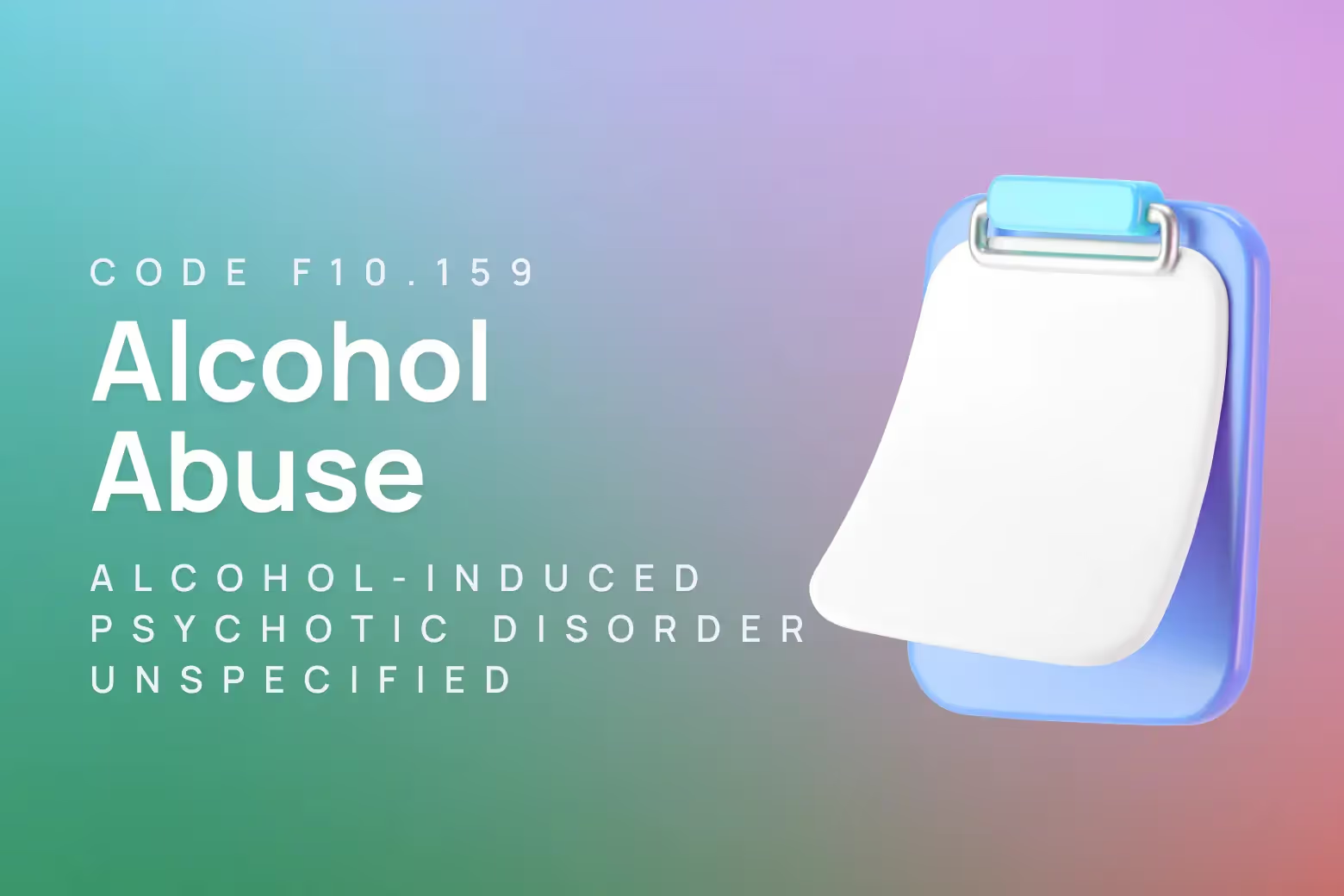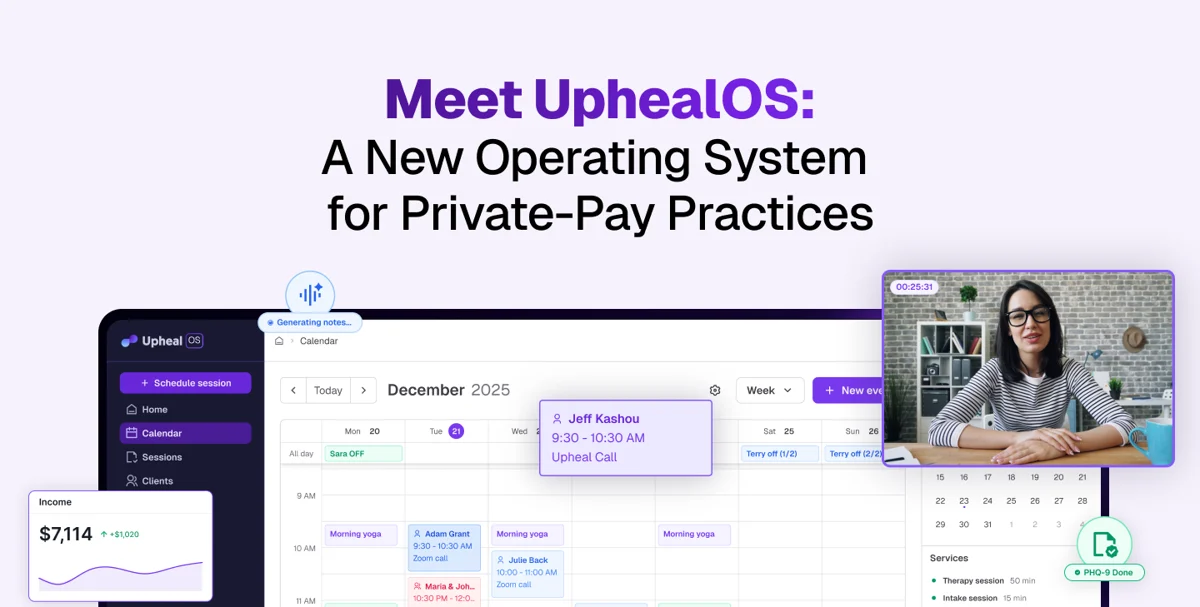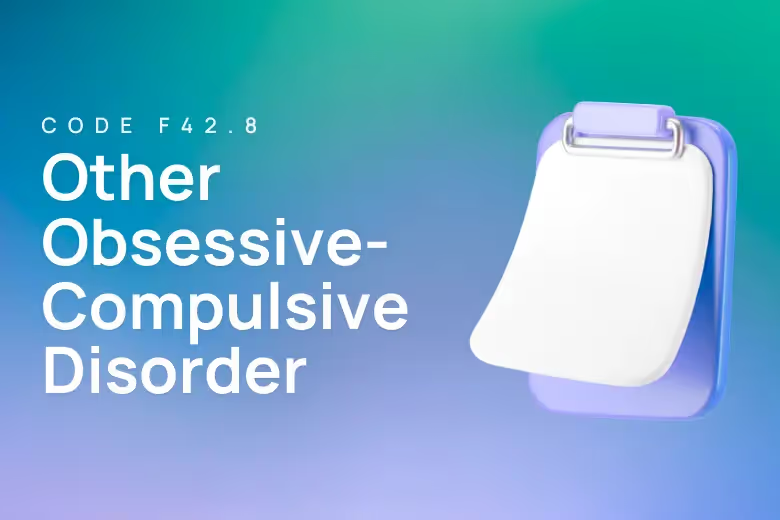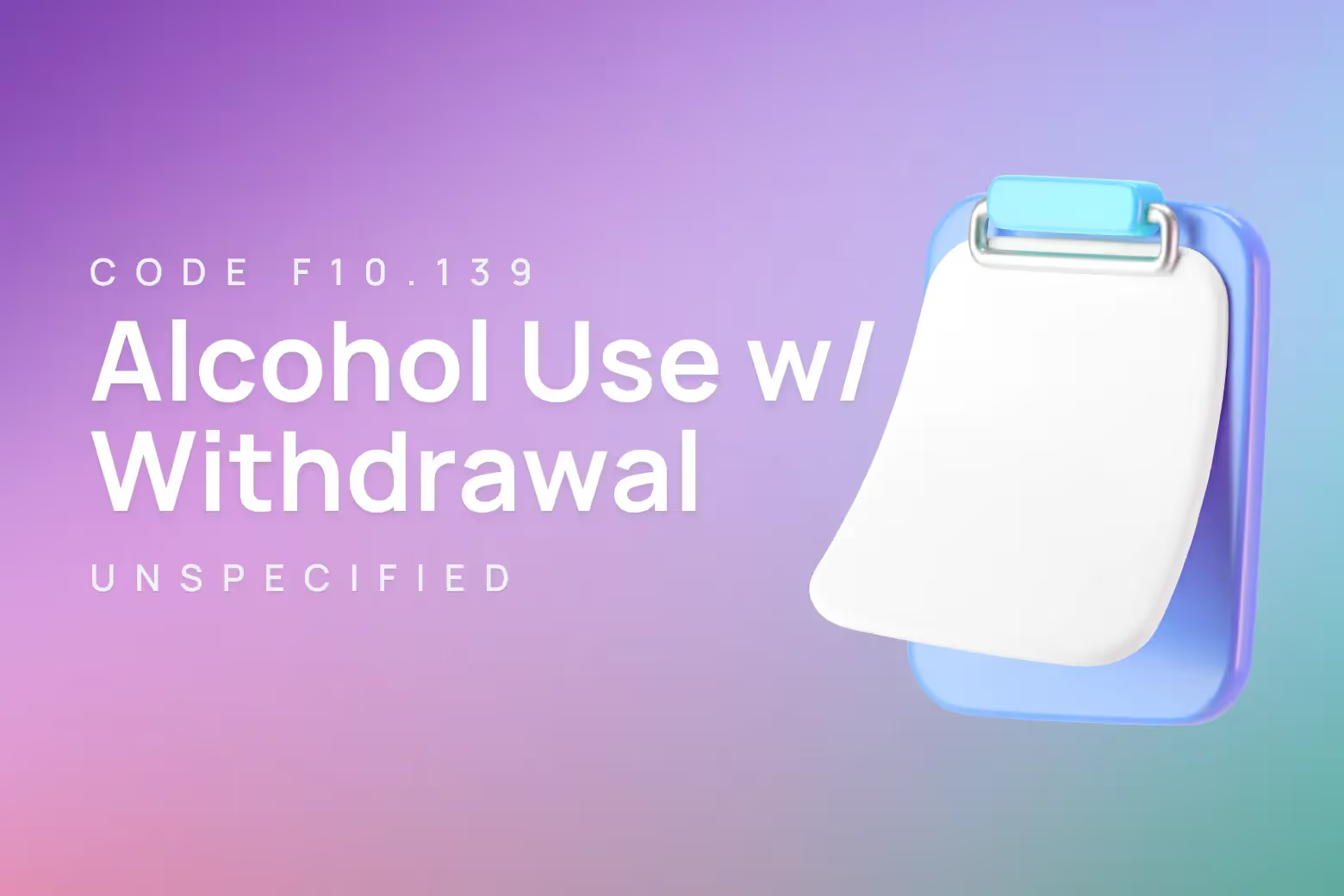ICD-10 code for alcohol abuse with alcohol-induced psychotic disorder, unspecified

F10.159 is the ICD-10 code for alcohol abuse with alcohol-induced psychotic disorder, unspecified.
This code represents cases where individuals meet criteria for alcohol abuse pattern while experiencing psychotic symptoms directly caused by alcohol use, but the specific type of psychotic features cannot be determined or specified.
Accurate diagnosis requires careful assessment to distinguish alcohol-induced psychosis from other psychotic conditions.
Key features:
- F10.159 ICD-10 code applies when alcohol abuse co-occurs with psychotic symptoms caused by alcohol
- Used when psychotic features cannot be specified as delusions or hallucinations
- Requires evidence that psychotic symptoms are directly related to alcohol use
- Differentiates from primary psychotic disorders and withdrawal-related hallucinations

Diagnostic criteria for alcohol abuse with alcohol-induced psychotic disorder (F10.159)
F10.159 combines the diagnostic requirements for alcohol abuse with the presence of alcohol-induced psychotic symptoms that cannot be classified as specifically delusional or hallucinatory.
The alcohol abuse component requires a problematic pattern of alcohol use leading to clinically significant impairment occurring within a 12-month period.
This pattern must include at least two specific behavioral indicators such as consuming alcohol in larger amounts than intended, persistent unsuccessful efforts to control use, or continued use despite social problems.
Key diagnostic requirements include:
- Recurrent alcohol use resulting in failure to fulfill major role obligations at work, school, or home
- Continued alcohol use despite persistent social or interpersonal problems caused or worsened by alcohol effects
- Important social, occupational, or recreational activities given up or reduced because of alcohol use
- Recurrent alcohol use in physically hazardous situations
- Alcohol use continued despite knowledge of persistent physical or psychological problems likely caused by alcohol
The psychotic disorder component involves prominent hallucinations or delusions that develop during or shortly after alcohol intoxication or withdrawal.
Unlike alcohol withdrawal hallucinations, these symptoms persist beyond the acute withdrawal period and cause significant distress or functional impairment.
When to use F10.159 diagnosis code
F10.159 applies in complex clinical presentations where alcohol abuse coincides with psychotic symptoms directly attributable to alcohol use.
Proper differential diagnosis requires distinguishing this condition from related but distinct presentations.
F10.159 vs F10.150 (Alcohol abuse with alcohol-induced psychotic disorder, with delusions)
F10.150 specifically identifies cases where delusions are the predominant psychotic feature. These involve fixed false beliefs that persist despite contrary evidence, often with themes of persecution or grandiosity.
F10.159 is used when psychotic symptoms are present but cannot be clearly categorized as primarily delusional or hallucinatory, or when both features occur simultaneously without clear predominance of either type.
F10.159 vs F10.151 (Alcohol abuse with alcohol-induced psychotic disorder, with hallucinations)
F10.151 applies when hallucinations represent the primary psychotic manifestation. These typically involve auditory perceptions without external stimuli, though visual or tactile hallucinations may also occur.
F10.159 provides diagnostic flexibility for presentations where the specific nature of psychotic symptoms remains unclear or includes mixed features that don't fit neatly into either category.
F10.159 vs alcohol withdrawal hallucinations
Alcohol withdrawal hallucinations occur during the acute withdrawal phase, typically within 12-48 hours of cessation, and resolve as withdrawal symptoms subside. These are considered part of the withdrawal syndrome rather than a distinct psychotic disorder.
F10.159 involves psychotic symptoms that persist beyond acute withdrawal or occur during periods of active alcohol use, indicating a more sustained relationship between alcohol and psychotic symptoms (guidelines-for-the-treatment-of-alcohol-problems.pdf).
Related ICD-10 codes
- F10.15 - Alcohol abuse with alcohol-induced psychotic disorder (parent code)
- F10.150 - Alcohol abuse with alcohol-induced psychotic disorder, with delusions
- F10.151 - Alcohol abuse with alcohol-induced psychotic disorder, with hallucinations
Interventions and CPT codes for alcohol abuse with alcohol-induced psychotic disorder
Treatment for F10.159 requires integrated approaches addressing both the underlying alcohol abuse and the psychotic symptoms.
Evidence-based interventions focus on achieving alcohol abstinence while managing acute psychotic manifestations.
Cognitive behavioral therapy
Cognitive behavioral therapy represents the first-line psychosocial intervention for alcohol dependence and abuse.
CBT helps clients identify triggers for alcohol use while developing effective coping strategies for managing both substance use urges and psychotic symptoms.
The therapeutic approach typically begins with comprehensive assessment combined with motivational interviewing to resolve ambivalence about change. Skills training components include coping strategies, relapse prevention techniques, and stress management approaches.
CPT codes for CBT:
- 90834 - Psychotherapy, 45 minutes (most common session length)
- 90837 - Psychotherapy, 60 minutes (for complex presentations)
- 90832 - Psychotherapy, 30 minutes (for brief follow-up sessions)
Coping skills training
Coping skills training provides alternative strategies to cope with situations that may lead to drinking.
This approach includes communication skills, listening techniques, assertiveness training, problem-solving skills, and drinking refusal techniques.
For clients with psychotic symptoms, coping skills training also addresses reality testing techniques and strategies for managing perceptual disturbances without resorting to alcohol use.
CPT codes for coping skills training:
- 90834 - Individual psychotherapy, 45 minutes
- 90853 - Group psychotherapy (when delivered in group format)
Relapse prevention
Relapse prevention forms a core component of treatment, recognizing that return to problematic drinking represents a common challenge.
This approach helps clients identify high-risk situations, develop coping strategies, and create comprehensive relapse prevention plans.
For F10.159 presentations, relapse prevention must address triggers for both alcohol use and psychotic symptoms, as these often interact in complex ways.
CPT codes for relapse prevention:
- 90837 - Individual psychotherapy, 60 minutes (for comprehensive planning)
- 90834 - Individual psychotherapy, 45 minutes (for ongoing sessions)
Integrated dual diagnosis treatment
Integrated treatment approaches simultaneously address both the alcohol abuse and psychotic symptoms rather than treating them as separate conditions.
This coordination improves overall treatment outcomes and reduces the risk of treatment complications.
CPT codes for integrated treatment:
- 90791 - Psychiatric diagnostic evaluation (comprehensive initial assessment)
- 90834 - Psychotherapy, 45 minutes (ongoing integrated treatment sessions)
- 90847 - Family psychotherapy with patient present (to address family dynamics)
Brief intervention and screening
For early identification and intervention, structured screening and brief intervention approaches help identify alcohol-related problems before they progress to more severe presentations.
CPT codes for screening and brief intervention:
- 99408 - Alcohol screening and brief intervention, 15-30 minutes
- 99409 - Alcohol screening and brief intervention, greater than 30 minutes
- 96127 - Brief emotional/behavioral assessment per standardized instrument
How Upheal improves F10.159 ICD-10 documentation
Clinical documentation for alcohol-induced psychotic disorders requires detailed attention to both substance use patterns and psychotic symptom presentations.
Managing this dual complexity while maintaining accurate records presents significant challenges for behavioral health providers.
Suggesting appropriate ICD-10 codes based on session content
Upheal's clinical documentation platform analyzes session content to identify key diagnostic indicators for both alcohol abuse and psychotic symptoms.
The system recognizes patterns in client presentations that suggest F10.159 rather than related codes like F10.150 or F10.151.
By tracking mention of alcohol use patterns, psychotic symptoms, and their temporal relationships, Upheal helps ensure appropriate code selection.
This reduces the risk of miscoding conditions that appear similar but require different diagnostic approaches.
Maintaining HIPAA-compliant records with proper diagnostic coding
Documentation for F10.159 must capture complex interactions between substance use and psychiatric symptoms while protecting client confidentiality.
Upheal maintains secure, HIPAA-compliant records that properly document diagnostic rationale and treatment planning.
The platform helps organize information about alcohol use severity, psychotic symptom duration, and functional impact in ways that support accurate diagnosis and treatment planning.
This comprehensive approach ensures clinical records meet both regulatory requirements and treatment continuity needs.
Reducing administrative burden so you can focus on client care
Managing documentation for dual diagnosis presentations like F10.159 typically requires extensive time spent organizing notes, tracking symptoms, and ensuring proper coding compliance. This administrative load can detract from direct client care time.
Upheal automates many documentation tasks, allowing providers to spend more time on therapeutic interventions and clinical assessment.
The platform handles routine documentation requirements while ensuring all necessary information is captured for proper diagnosis and treatment planning.
Supporting clients with alcohol abuse with alcohol-induced psychotic disorder
Clients presenting with F10.159 face unique challenges that require specialized clinical attention and coordinated care approaches.
The combination of alcohol abuse and psychotic symptoms creates complex treatment dynamics requiring both immediate safety assessment and long-term recovery planning.
Treatment success depends on addressing both conditions simultaneously rather than sequentially.
Clients often experience confusion about the relationship between their alcohol use and psychotic symptoms, making psychoeducation a crucial component of early treatment phases.
Safety considerations become paramount when psychotic symptoms interact with alcohol use. Clinicians must carefully assess for suicide risk, particularly given research highlighting increased suicide risk in alcohol-related hallucinosis presentations.
Regular monitoring and crisis intervention planning help ensure client safety during acute phases of treatment.
The therapeutic relationship requires patience and consistency as clients navigate both substance use recovery and management of psychotic symptoms.
Recovery often involves periods of symptom fluctuation as alcohol use patterns change and psychotic symptoms respond to treatment interventions.
Modern treatment approaches recognize that successful outcomes require comprehensive support addressing both the biological and psychological aspects of these co-occurring conditions.
Upheal's clinical documentation platform supports this comprehensive approach by helping providers maintain detailed, organized records while reducing the administrative burden that can interfere with direct client care.
This allows clinicians to focus their attention on delivering the integrated, evidence-based interventions that clients with F10.159 presentations need for successful recovery.













